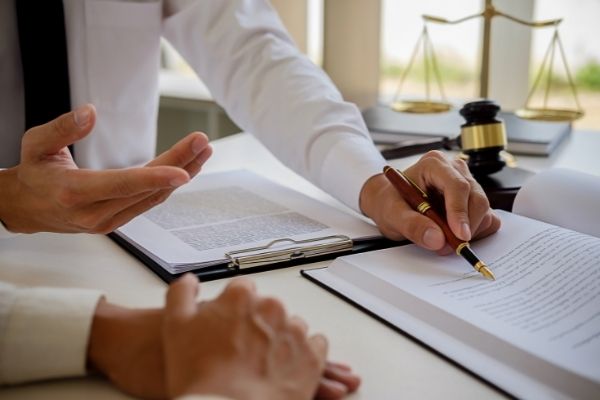Fraud or Unfair and Deceptive Trade Practices
 When a business employs unfair practices or operations, it can infringe on the rights of other businesses or even customers. Whether an act is oppressive, immoral, unscrupulous, injurious, or unethical, you may have legal options to get justice. These cases are part of business torts. Business torts involve misleading ads, fraud, misrepresentation, overcharging customers, or defaming another business's services or products.
When a business employs unfair practices or operations, it can infringe on the rights of other businesses or even customers. Whether an act is oppressive, immoral, unscrupulous, injurious, or unethical, you may have legal options to get justice. These cases are part of business torts. Business torts involve misleading ads, fraud, misrepresentation, overcharging customers, or defaming another business's services or products.
While these claims can be challenging to prove, reputable deceptive trade practices attorneys can help with your case. Huber Thomas Law can assist business owners dealing with unfair practices and consumers affected by deceptive trade practices. Here's how.
What Are Trade Practices?
Before moving into what makes certain trade practices unfair or deceptive, it’s important to start with the basics. What are trade practices?
In short, they're rules or methods that a business uses, along with secret practices, to gain an advantage over competitors. Law can formally codify some things, like trademarks.
Obviously, trade practices can encompass a lot, which means defining unfair or deceptive trade practices may be complex.
Types Of Deceptive Trade Practices
Even though trade practices are all-encompassing, there are a few types of cases or conflicts that are more common. These are some of the more important types of deceptive trade practices to be familiar with.
Have additional questions or don't see your exact type of case on this list? Don't worry. Contact our team at Huber Thomas Law and we'll set up a free consultation to go over your questions.
Misleading advertising
Advertising is an important part of any business selling products or services. This is the best way to gain more customers and boost revenue. Unfortunately, misleading or false advertising is a common issue to navigate for all of us as consumers.
Examples of deceptive trade practices in this area include making false statements, omitting important details, and advertising unavailable goods or services. While many companies exaggerate the benefits of their products, it is unlawful to completely fabricate information.
For reference, Dannon lost a class-action lawsuit filed against it in 2010, wherein the class alleged false claims made by Dannon about two of its yogurt products. Advertising for Activia and DanActive claimed “clinically proven” health benefits that the company could not demonstrate. As a result of the lawsuit, Dannon provided monetary damages and modified its advertising.
Overcharging or price-fixing
As consumers, we’re all looking to save where we can. That’s why the price of goods and services is an important aspect of the buying process. There are some instances where companies may illegally overcharge or fix prices, leading to deceptive trade practices.
One of the most common examples of this is tacking on hidden fees or undisclosed charges. If a hotel advertises a certain nightly rate but fails to mention a required “resort fee,” there's an element of deception for consumers.
This can affect business owners who work with vendors or contractors that have set prices for a specific product or service.
Commercial fraud
Commercial fraud refers to a deliberate business action that can involve dishonesty or criminal activity. While there are many different fraudulent activities that can arise in business dealings, some of the most common include:
- Misappropriation of funds
- Fraudulent expense claims
- Unauthorized financial withdrawals
- False accounting to mislead shareholders
- Breaches of fiduciary duty
- Conspiracy
- Breach of contract
- Bribery
- Tax evasion
- Overstating company profits
If someone or a company unfairly gains from someone else's dishonesty, they can face a lawsuit for commercial fraud.
Commercial misrepresentation
Making false or misleading statements to urge another party into a contract can lead to a commercial misrepresentation case.
When buying a used car, it's common to request a report on the car's accident history. If the dealer lies about the car's history and you buy it, you could have a case for misrepresentation.
It’s important to mention that in cases of misrepresentation, a party doesn’t have to know that a statement is false in order to be liable. If they should have known better due to training or expertise, they may still be accountable for this type of contract violation.
Defamation
A competitive market is good for our economy, but unfortunately, it can lead to issues of defamation. This occurs when a company uses deceptive practices to reduce a competitor’s sales or reputation. It is similar to false advertising as it is built on misrepresentation and false statements that are designed to mislead the public. When these comments are made in written form, such as newspaper articles or books, we commonly call them trade libel.
It’s important to note that these cases can be difficult to prove in court. As a victim, you must be able to prove that your business suffered financial harm as a direct result of the defamation. It should also be clear that the comments were made out of malice, and you should be able to demonstrate that they are completely false.

State Laws Regarding Deceptive Trade Practices
Cases involving deceptive trade practices can be complicated due to differences across state lines. While most states have clear legislation to follow, they can vary greatly compared to other states.
In Texas, for example, the Office of the Attorney General uses the Deceptive Trade Practices Act (DTPA) to protect consumers. This piece of legislation lists many practices that are false, deceptive, or misleading. If you were a victim, you may be able to recover three times your damages. This is possible if you can show that the defendant intentionally deceived you.
Louisiana follows the Uniform Deceptive Trade Practices Act (UDTPA), a federal law that helps with deceptive trade practices. This Act is broad, which means it can reach many different aspects of deceptive trade practices. Several other states across the country use it.
The most important thing you can do is find an attorney who is knowledgeable about your state’s laws regarding these types of disputes. A lawyer can help you understand your state laws.
They can also help you identify evidence of unfair trade practices that have impacted you or your business. Additionally, they can assist you in exploring your legal options. Working with an experienced attorney is the best way to make a strong case that will hold up in court.
.
Have You Been A Victim?
If deceptive trade practices have harmed you or your business, it's important that you seek compensation for your damages. But where do you begin?
First, gather as much documentation as possible. From emails to contracts and any other correspondence, this is the foundation of a strong case. Collect as much information as you can, including any notes from phone calls, texts, and more. This can help you prove that the party in question was at fault.
While the criteria for each case will be different, it will likely be important to provide proof of measurable financial harm or loss as well. This is where financial records like bank statements or revenue reporting will be critical.
After sorting through the necessary information, it’s time to call reputable deceptive trade practices attorneys. This is the best way to determine whether you have a strong enough case to pursue damages. While the law may seem overwhelming for average consumers, an experienced lawyer can accurately assess your situation.
Get The Help You Need From Huber Thomas & Marcelle
The deceptive trade practice attorneys at Huber Thomas Law take a collaborative approach to every case. A teamwork approach allows our clients to benefit from a range of diverse and varying viewpoints. You will certainly have a specific lawyer working on your case, but we can achieve the best outcomes when we all work together.
Even though the majority of cases settle outside of court, our team prepares for every single case as if it's going to trial. We conduct extensive research and lean on expert witnesses throughout our preparation period. If the case goes to mediation, we have built a strong advantage at the negotiation table. If it does go to trial, we're ready to get you the justice you deserve.
From consumers to businesses, our team has helped recover millions of dollars in a range of different case victories. Some of these include:
- $3 million for someone who suffered extensive damages from a failed joint business venture
- A $5.7 million award for a business owner unjustly written out of a business deal by his partners
- $42 million for victims harmed by home health companies and physicians committing Medicare fraud
If you would like to learn more about us, we encourage you to take a look at our other case victories. While deceptive trade practices cases are complex, we have the know-how to present a strong case for you.

Learn More
At Huber Thomas Law, we will walk you through every step of the legal process. Since litigation can often feel overwhelming, it helps to have an outstanding team in your corner. We know what it takes to create a compelling case, and we want to help you secure the compensation you deserve.
If you’d like to discuss your unfair or deceptive trade practices case, contact us to set up a free consultation. We represent clients in Louisiana, Texas, Mississippi, and nationwide.




